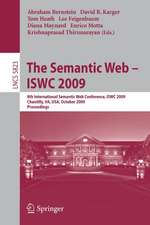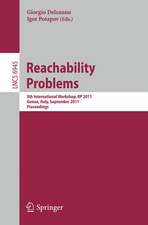Online Worlds: Convergence of the Real and the Virtual: Human–Computer Interaction Series
Editat de William Sims Bainbridgeen Limba Engleză Paperback – 18 dec 2009
Din seria Human–Computer Interaction Series
- 20%
 Preț: 655.85 lei
Preț: 655.85 lei - 20%
 Preț: 309.27 lei
Preț: 309.27 lei - 20%
 Preț: 375.54 lei
Preț: 375.54 lei - 20%
 Preț: 644.48 lei
Preț: 644.48 lei - 20%
 Preț: 667.75 lei
Preț: 667.75 lei - 20%
 Preț: 664.44 lei
Preț: 664.44 lei - 20%
 Preț: 1164.84 lei
Preț: 1164.84 lei - 20%
 Preț: 817.55 lei
Preț: 817.55 lei - 20%
 Preț: 657.16 lei
Preț: 657.16 lei - 20%
 Preț: 645.31 lei
Preț: 645.31 lei - 20%
 Preț: 938.66 lei
Preț: 938.66 lei - 15%
 Preț: 658.05 lei
Preț: 658.05 lei - 20%
 Preț: 822.51 lei
Preț: 822.51 lei - 20%
 Preț: 654.21 lei
Preț: 654.21 lei - 20%
 Preț: 994.26 lei
Preț: 994.26 lei - 20%
 Preț: 1621.89 lei
Preț: 1621.89 lei - 20%
 Preț: 991.60 lei
Preț: 991.60 lei - 20%
 Preț: 783.46 lei
Preț: 783.46 lei - 20%
 Preț: 1175.42 lei
Preț: 1175.42 lei - 20%
 Preț: 659.97 lei
Preț: 659.97 lei - 20%
 Preț: 219.15 lei
Preț: 219.15 lei - 20%
 Preț: 334.86 lei
Preț: 334.86 lei - 20%
 Preț: 969.85 lei
Preț: 969.85 lei - 20%
 Preț: 642.19 lei
Preț: 642.19 lei - 20%
 Preț: 314.39 lei
Preț: 314.39 lei - 20%
 Preț: 661.14 lei
Preț: 661.14 lei - 20%
 Preț: 995.89 lei
Preț: 995.89 lei - 20%
 Preț: 752.59 lei
Preț: 752.59 lei - 20%
 Preț: 990.30 lei
Preț: 990.30 lei - 20%
 Preț: 990.12 lei
Preț: 990.12 lei - 20%
 Preț: 336.21 lei
Preț: 336.21 lei - 20%
 Preț: 334.71 lei
Preț: 334.71 lei - 20%
 Preț: 312.62 lei
Preț: 312.62 lei - 20%
 Preț: 994.92 lei
Preț: 994.92 lei - 20%
 Preț: 331.74 lei
Preț: 331.74 lei - 20%
 Preț: 334.86 lei
Preț: 334.86 lei - 20%
 Preț: 994.40 lei
Preț: 994.40 lei - 20%
 Preț: 329.76 lei
Preț: 329.76 lei - 20%
 Preț: 332.24 lei
Preț: 332.24 lei - 20%
 Preț: 992.11 lei
Preț: 992.11 lei - 20%
 Preț: 650.40 lei
Preț: 650.40 lei - 20%
 Preț: 337.00 lei
Preț: 337.00 lei - 20%
 Preț: 332.39 lei
Preț: 332.39 lei - 20%
 Preț: 1279.86 lei
Preț: 1279.86 lei - 15%
 Preț: 636.12 lei
Preț: 636.12 lei - 20%
 Preț: 336.67 lei
Preț: 336.67 lei - 20%
 Preț: 1000.70 lei
Preț: 1000.70 lei - 20%
 Preț: 645.14 lei
Preț: 645.14 lei
Preț: 646.80 lei
Preț vechi: 808.50 lei
-20% Nou
Puncte Express: 970
Preț estimativ în valută:
123.80€ • 134.52$ • 104.06£
123.80€ • 134.52$ • 104.06£
Carte tipărită la comandă
Livrare economică 21 aprilie-05 mai
Preluare comenzi: 021 569.72.76
Specificații
ISBN-13: 9781848828247
ISBN-10: 1848828241
Pagini: 312
Ilustrații: VIII, 318 p. 8 illus., 4 illus. in color.
Dimensiuni: 155 x 235 x 20 mm
Greutate: 0.45 kg
Ediția:2010
Editura: SPRINGER LONDON
Colecția Springer
Seria Human–Computer Interaction Series
Locul publicării:London, United Kingdom
ISBN-10: 1848828241
Pagini: 312
Ilustrații: VIII, 318 p. 8 illus., 4 illus. in color.
Dimensiuni: 155 x 235 x 20 mm
Greutate: 0.45 kg
Ediția:2010
Editura: SPRINGER LONDON
Colecția Springer
Seria Human–Computer Interaction Series
Locul publicării:London, United Kingdom
Public țintă
ResearchCuprins
New World View.- Culture and Creativity: World of Warcraft Modding in China and the US.- The Diasporic Game Community: Trans-Ludic Cultures and Latitudinal Research Across Multiple Games and Virtual Worlds.- Science, Technology, and Reality in The Matrix Online and Tabula Rasa.- Spore: Assessment of the Science in an Evolution-Oriented Game.- Medulla: A Cyberinfrastructure-Enabled Framework for Research, Teaching, and Learning with Virtual Worlds.- A Virtual Mars.- Opening the Metaverse.- A Typology of Ethnographic Scales for Virtual Worlds.- Massively Multiplayer Online Games as Living Laboratories: Opportunities and Pitfalls.- Examining Player Anger in World of Warcraft.- Dude Looks like a Lady: Gender Swapping in an Online Game.- Virtual Doppelgangers: Psychological Effects of Avatars Who Ignore Their Owners.- Speaking in Character: Voice Communication in Virtual Worlds.- What People Talk About in Virtual Worlds.- Changing the Rules: Social Architectures in Virtual Worlds.- Game-Based Virtual Worlds as Decentralized Virtual Activity Systems.- When Virtual Worlds Expand.- Cooperation, Coordination, and Trust in Virtual Teams: Insights from Virtual Games.- Virtual Worlds for Virtual Organizing.- Future Evolution of Virtual Worlds as Communication Environments.- The Future of Virtual Worlds.
Textul de pe ultima copertă
Virtual worlds are persistent online computer-generated environments where people can interact, whether for work or play, in a manner comparable to the real world. The most popular current example is World of Warcraft, a massively multiplayer online game with eleven million subscribers. However, other virtual worlds, notably Second Life, are not games at all but internet-based collaboration contexts in which people can create virtual objects, simulated architecture, and working groups.
This book brings together an international team of highly accomplished authors to examine the phenomena of virtual worlds, using a range of theories and methodologies to discover the principles that are making virtual worlds increasingly popular, and which are establishing them as a major sector of human-centred computing.
This book brings together an international team of highly accomplished authors to examine the phenomena of virtual worlds, using a range of theories and methodologies to discover the principles that are making virtual worlds increasingly popular, and which are establishing them as a major sector of human-centred computing.
Caracteristici
Online Worlds" is a landmark publication about virtual worlds, exploring the cutting edge of social computing, and based on solid scientific research It is based on solid methodological approaches including participation observation ethnography, quantitative statistical analysis, laboratory experimentation, design studies, and others Virtual worlds are of increasing popular and scientific interest, and the breadth of this book will make it accessible to a wide audience



























